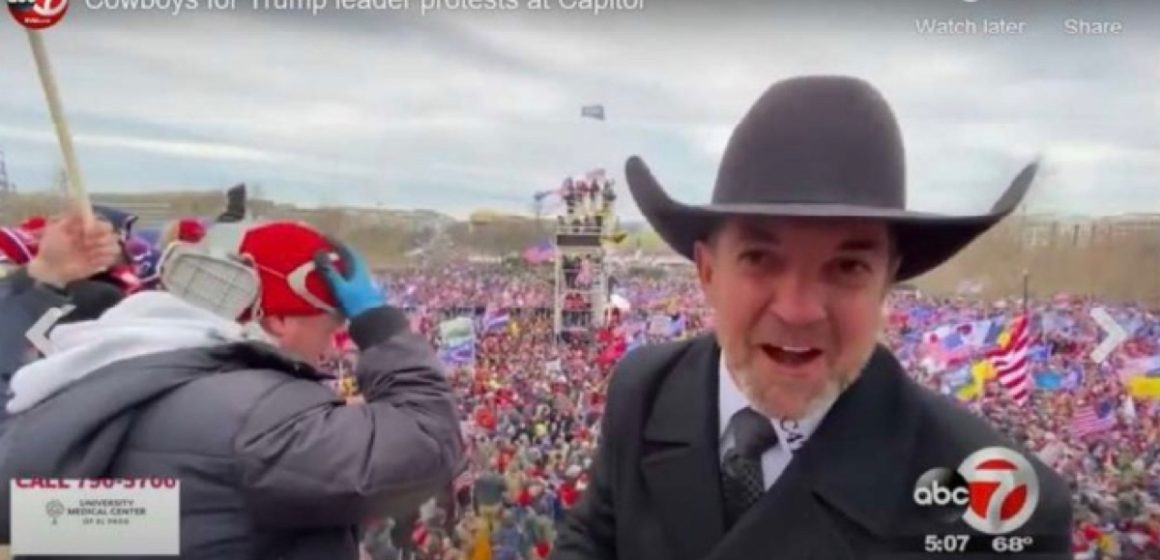A federal court of appeals on Tuesday denied a prominent Jan. 6 defendant’s effort to overturn his misdemeanor trespass conviction.
In March 2022, Couy Griffin, the founder of “Cowboys for Trump” and a former New Mexico county commissioner, was convicted on one count of entering a restricted area on the Capitol grounds and acquitted on one count of disorderly and disruptive conduct in a restricted building. The bench trial was overseen by Donald Trump-appointed U.S. District Judge Trevor McFadden.
On the day of the riot, Griffin made his way into a restricted area that had been cordoned off and closed to the public in order to protect then-Vice President Mike Pence as he waited to oversee vote tallies.
In determining the defendant’s guilt, the lower court judge said Griffin “certainly knew he shouldn’t be there” and “yet, he remained.”
On appeal, the defendant argued his actions did not satisfy the part of the statute that criminalizes trespassing in non-public places.
Griffin said his actions should be reasonably viewed as innocent because the Capitol grounds are typically open to the public, and earlier rioters had dispensed with various law enforcement barriers and signage indicating the area had been restricted.
That argument did not go over well with the majority.
“Under his reading, a defendant would be entitled to acquittal so long as he waited until a sufficiently strong gust of wind, a soaking downpour — or even a less scrupulous prior intruder — disposed of law enforcement tape, fencing, or signage before he entered a sensitive area in full awareness he was not lawfully authorized to do so,” the opinion reads. “We decline to read the statute to allow a mob to de-restrict an officially restricted area encompassing persons under Secret Service protection.”
The court explains its reasoning, at length:
The defendant also argued that he lacked the requisite mental state required to commit the crime because he did not know he was trespassing. A related defense argument on the mental state issue was that the court failed to require the government to prove Griffin knew why trespassing in that particular instance would be a crime.
In what might pass for a rehash of the discussion about what Griffin actually did, the court goes through a lengthy recitation about what the government actually proved during the bench trial.
Again, the majority at length:
As for the argument that prosecutors never proved he knew why the grounds were restricted, the court concluded: “The government was not required to prove that Griffin was aware that the Vice President’s presence was the reason the grounds remained restricted.”
Public policy reasons undergird the appellate court’s interpretation of the relevant statute at issue in the case.
“We hold that knowingly breaching the restricted area suffices, even without knowing the basis of the restriction—here, the presence of Vice President Pence at the Capitol on January 6,” the opinion by Circuit Judge Nina Pillard reads. “Congress intended to criminalize trespasses endangering Secret Service protectees regardless of the trespasser’s awareness of the basis for Congress’s authority to regulate them. And a contrary interpretation would impair the Secret Service’s ability to protect its charges.”
More Law&Crime coverage: Judge Disqualifies New Mexico County Commissioner and ‘Cowboys for Trump’ Founder for Having ‘Engaged in’ the Jan. 6 ‘Insurrection’
In ruling against Griffin, however, the court did not just reject the defense’s argument. They also rejected a mens rea –mental state – requirement altogether.
The majority said applying such a requirement “would pointlessly hinder the Secret Service’s ability to defend national leaders from would-be assassins and encumber prosecution of persons whose knowing trespasses endanger persons under Secret Service protection.”
In dissent, Circuit Judge Gregory Katsas said the rationale advanced by the majority was actually an argument in favor of retaining a highly specific mental state requirement.
From the dissent, at length:
Have a tip we should know? [email protected]
Note: Thank you for visiting our website! We strive to keep you informed with the latest updates based on expected timelines, although please note that we are not affiliated with any official bodies. Our team is committed to ensuring accuracy and transparency in our reporting, verifying all information before publication. We aim to bring you reliable news, and if you have any questions or concerns about our content, feel free to reach out to us via email. We appreciate your trust and support!


